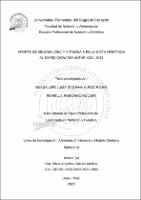| dc.contributor.advisor | Salinas Medina, Silvia Angélica | |
| dc.contributor.author | Núñez Rojas, Guadalupe Luisa Giuliana | |
| dc.contributor.author | Rosciano Holder, Fiorella | |
| dc.date.accessioned | 2023-11-27T22:52:00Z | |
| dc.date.available | 2023-11-27T22:52:00Z | |
| dc.date.issued | 2023 | |
| dc.identifier.uri | http://hdl.handle.net/20.500.11955/1176 | |
| dc.description.abstract | Fondo: La exposición a diferentes estresores presentes en los expedicionarios puede generar una alteración en la funcionalidad de los diferentes componentes del sistema inmune, provocando una inmunosupresión y aumento de los radicales libres, por lo que radica la importancia de optimizar diferentes nutrientes claves como el selenio, zinc y vitamina E, para apoyar en la función inmunológica. Objetivo: Evaluar el aporte de selenio, zinc y vitamina E en la dieta ofertada al expedicionario ANTAR XXIX, 2023. Metodología: Estudio descriptivo, aplicativo y no experimental, en donde se midió a través del método de pesada directa de alimentos un total de 36 muestras entre desayuno, almuerzo y cena durante tres días no consecutivos y un día de fin de semana brindados por la ECAMP al Expedicionario ANTAR XXIX, de los cuales se obtuvo doce registros diarios. De igual manera, para la determinación de cada micronutriente se usó la base de datos americana (USDA) para la obtención de la información requerida. Resultados: El aporte promedio de selenio, zinc, y vitamina E en la dieta ofertada al expedicionario ANTAR XXIX fue de 89.05 mcg, 9.85 mg y 3.67 mcg respectivamente. Asimismo, se observó que el aporte de los tres micronutrientes en función a los valores recomendados del RDI (2000-2001), tuvieron resultados significativos, siendo superior su aporte de selenio para ambos sexos y zinc para mujeres; por el contrario, los aportes de vitamina E para ambos géneros y zinc para hombres, fueron inferiores a lo recomendado. Conclusión: Existe una mayor prevalencia de un aporte inadecuado de los micronutrientes en la dieta del expedicionario, tanto en déficit como un aporte mayor al recomendado, por lo cual se invita a seguir buscando mejorar y fortalecer la dieta en cuestión de calidad nutricional y así evitar en el futuro un impacto a nivel de sistema inmune, teniendo en cuenta la importancia de estos micronutrientes en su fortalecimiento y función. | es_PE |
| dc.description.abstract | Background Exposure to different stressors present in expedition members can generate an alteration in the functionality of the different components of the immune system, causing immunosuppression and an increase in free radicals, which is why it is important to optimize different key nutrients such as e selenium, zinc and vitamin E, to support immune function. Objective: To evaluate the contribution of selenium, zinc and vitamin E in the diet offered to the expedition member ANTAR XXIX, 2023. Methods:: Descriptive, applicative and non-experimental study, where a total of 36 samples were measured using the method of direct food weighing between breakfast, lunch and dinner for three non-consecutive days and one weekend day provided by the ECAMP to the ANTAR XXIX Expeditionary, of which twelve daily records were obtained. In addition, for the determination of each micronutrient, the American database (USDA) was used to obtain the required information. Results: The average contribution of selenium, zinc, and vitamin E in the diet offered to the ANTAR XXIX expeditionary was 89.05 mcg, 9.85 mg and 3.67 mcg respectively. Likewise, it was observed that the contribution of the three micronutrients based on the recommended values of the RDI (2000-2001), had significant results, their contribution of selenium being higher for both sexes and zinc for women; on the contrary, the intakes of vitamin E for both genders and zinc for men were lower than recommended. Conclusion: There is a higher prevalence of an inadequate contribution of micronutrients in the expeditionary's diet, both in deficit and a higher than recommended contribution, for which it is invited to continue seeking to improve and strengthen the diet in terms of nutritional quality and thus avoid an impact at the immune system level in the future, taking into account the importance of these micronutrients in its strengthening and function. | es_PE |
| dc.description.uri | Tesis | |
| dc.format | application/pdf | es_PE |
| dc.language.iso | spa | es_PE |
| dc.publisher | Universidad Femenina del Sagrado Corazón | es_PE |
| dc.rights | info:eu-repo/semantics/closedAccess | es_PE |
| dc.rights.uri | https://creativecommons.org/licenses/by-nc-nd/4.0/ | es_PE |
| dc.source | Repositorio Institucional - UNIFÉ | es_PE |
| dc.subject | Nutrición--Tesis | es_PE |
| dc.subject | Selenio | es_PE |
| dc.subject | Zinc | es_PE |
| dc.subject | Vitamina E | es_PE |
| dc.subject | Evaluación cualitativa de menús | es_PE |
| dc.title | Aporte de selenio, zinc y vitamina E en la dieta ofertada al expedicionario Antar XXIX, 2023 | es_PE |
| dc.type | info:eu-repo/semantics/bachelorThesis | es_PE |
| thesis.degree.name | Licenciada en Nutrición y Dietética | es_PE |
| thesis.degree.grantor | Universidad Femenina del Sagrado Corazón. Facultad de Nutrición y Alimentación | es_PE |
| thesis.degree.level | Título Profesional | es_PE |
| thesis.degree.discipline | Nutrición y Dietética | es_PE |
| dc.subject.ocde | https://purl.org/pe-repo/ocde/ford#3.03.04 | es_PE |
| renati.advisor.dni | 29410036 | |
| renati.advisor.orcid | https://orcid.org/0000-00002-2021-196X | es_PE |
| renati.author.dni | 75684199 | |
| renati.author.dni | 74248884 | |
| renati.discipline | 918066 | es_PE |
| renati.juror | Jiménez Arrunátegui, Yadira | es_PE |
| renati.juror | Santos Bandy, Marinalva | es_PE |
| renati.juror | Céspedes García, Elizabeth Melina | es_PE |
| renati.level | http://purl.org/pe-repo/renati/level#tituloProfesional | es_PE |
| renati.type | http://purl.org/pe-repo/renati/type#tesis | es_PE |
| dc.publisher.country | PE | es_PE |
| dc.description.lineadeinvestigacion | Alimentación Humana y Modelo Dietético Nutricional | es_PE |



